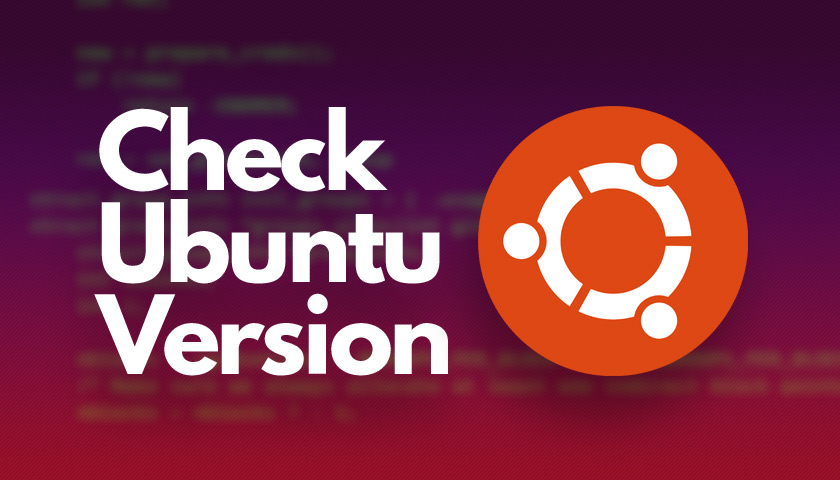To check the Ubuntu version, you can use several commands in the terminal.

Here are the most common methods
Method 1: check the Ubuntu version Using lsb_release Command
The lsb_release command provides detailed information about your Linux distribution.
lsb_release -a
This command will display output similar to:
No LSB modules are available.
Distributor ID: Ubuntu
Description: Ubuntu 20.04.3 LTS
Release: 20.04
Codename: focal
Method 2: Using /etc/os-release File
The /etc/os-release file contains information about the operating system.
cat /etc/os-release
This command will display output similar to:
NAME="Ubuntu" VERSION="20.04.2 LTS (Focal Fossa)" ID=ubuntu ID_LIKE=debian PRETTY_NAME="Ubuntu 20.04.2 LTS" VERSION_ID="20.04" HOME_URL="https://www.ubuntu.com/" SUPPORT_URL="https://help.ubuntu.com/" BUG_REPORT_URL="https://bugs.launchpad.net/ubuntu/" PRIVACY_POLICY_URL="https://www.ubuntu.com/legal/terms-and-policies/privacy-policy" VERSION_CODENAME=focal UBUNTU_CODENAME=focal
Method 3: Using hostnamectl Command
The hostnamectl command provides information about the system’s hostname and the operating system.
hostnamectl
This command will display output similar to:
Static hostname: ubuntu Icon name: computer-vm Chassis: vm Machine ID: 2c5b1a2e0a634c2d9f1a1d913db99e11 Boot ID: 716ee650c7d247a19a8e1945684e1b39 Operating System: Ubuntu 20.04.2 LTS Kernel: Linux 5.4.0-65-generic Architecture: x86-64
Method 4: Using /etc/issue File
The /etc/issue file contains a system identification message.
cat /etc/issue
This command will display output similar to:
Ubuntu 20.04.2 LTS \n \lMethod 5: Using neofetch (If Installed)
neofetch is a command-line utility that displays information about your system, including the OS version, in an aesthetic manner.
neofetch
If neofetch is not installed, you can install it using:
sudo apt update sudo apt install neofetch
These commands and methods will help you determine the version of Ubuntu you are running.
Being aware of the server’s Ubuntu version is crucial for several reasons:
1. Security
- Patches and Updates: Different versions of Ubuntu receive security updates and patches at different times. check the Ubuntu version ensures that you apply the correct patches to protect your server from vulnerabilities.
- End of Life (EOL): Each Ubuntu version has a defined support period. Once it reaches EOL, it no longer receives security updates, leaving your server vulnerable.
2. Compatibility
- Software Requirements: Certain software and applications require specific versions of Ubuntu to function correctly. check the Ubuntu version helps in ensuring compatibility and avoiding potential issues.
- Library Dependencies: Different Ubuntu versions come with different versions of libraries and dependencies. Installing software that relies on specific versions can be problematic if you are unaware of your current version.
3. Troubleshooting and Support
- Accurate Problem-Solving: When seeking support from forums, documentation, or professional services, specifying and check the Ubuntu version helps in diagnosing and solving issues accurately.
- Relevant Documentation: Most documentation is version-specific. Knowing your Ubuntu version ensures that you follow the correct instructions, avoiding errors and misconfigurations.
4. Performance and Features
- New Features: Newer versions of Ubuntu come with performance improvements, new features, and enhancements. check the Ubuntu version and Being aware of your version helps you decide if an upgrade is beneficial.
- Deprecated Features: Certain features might be deprecated in newer versions. Awareness helps in planning for transitions and avoiding the use of outdated features.
5. Compliance and Audit
- Regulatory Compliance: Some industries have strict regulatory requirements regarding software versions and update policies. Knowing and check the Ubuntu version & managing your Ubuntu version helps in maintaining compliance.
- Audit Readiness: During security audits, being able to provide accurate information about your server’s software versions, including Ubuntu, is essential.
6. System Administration
- Configuration Management: check the Ubuntu version is vital for system administrators when configuring and managing multiple servers. It helps in standardizing configurations and ensuring consistency.
- Automation Scripts: Many automation scripts are version-specific. check the Ubuntu version and Awareness of the server version ensures that scripts are written and executed correctly, avoiding failures.
Staying informed about your server’s Ubuntu version is a fundamental aspect of system administration, impacting security, compatibility, support, performance, compliance, and overall management efficiency. Regularly checking and documenting the version helps in maintaining a secure, stable, and well-supported server environment.
